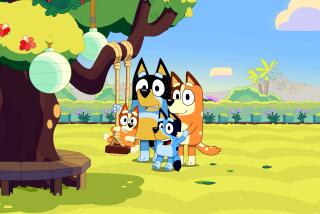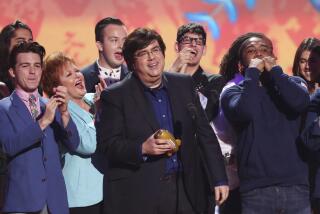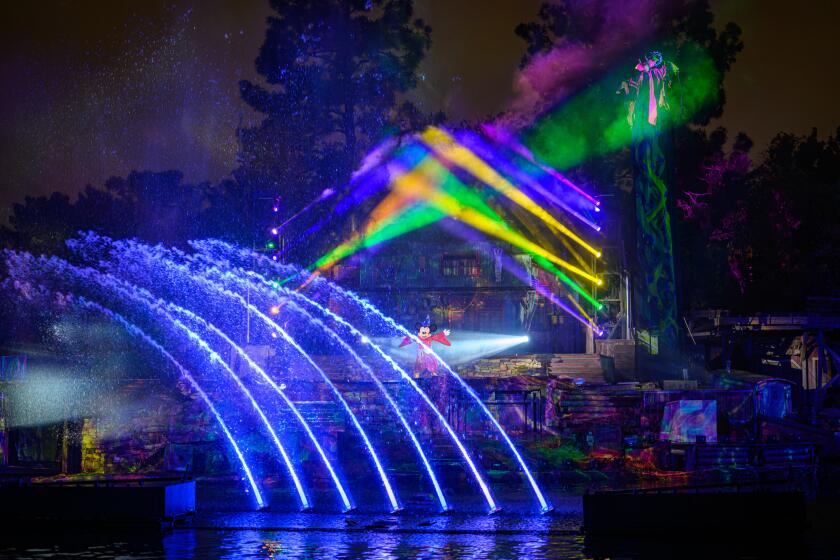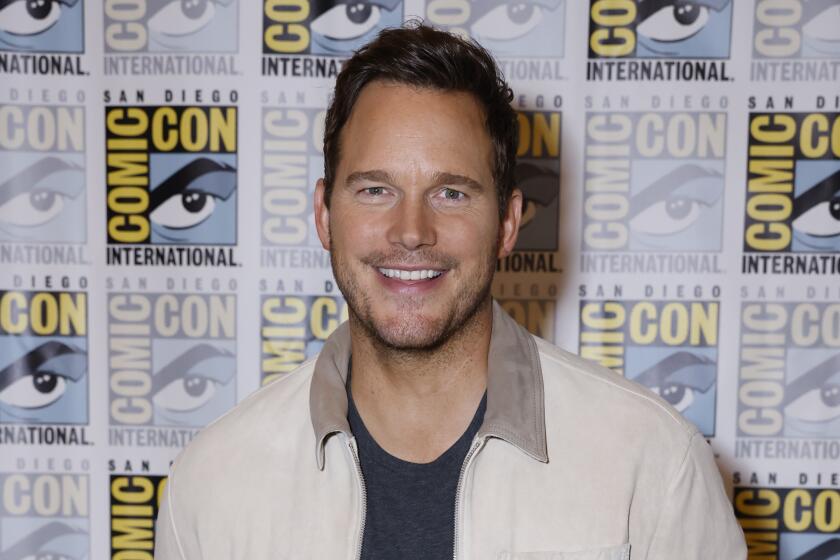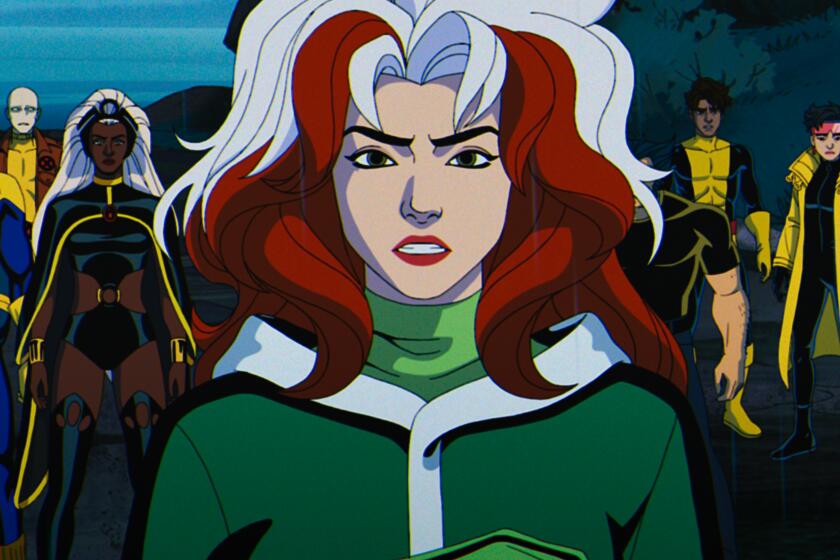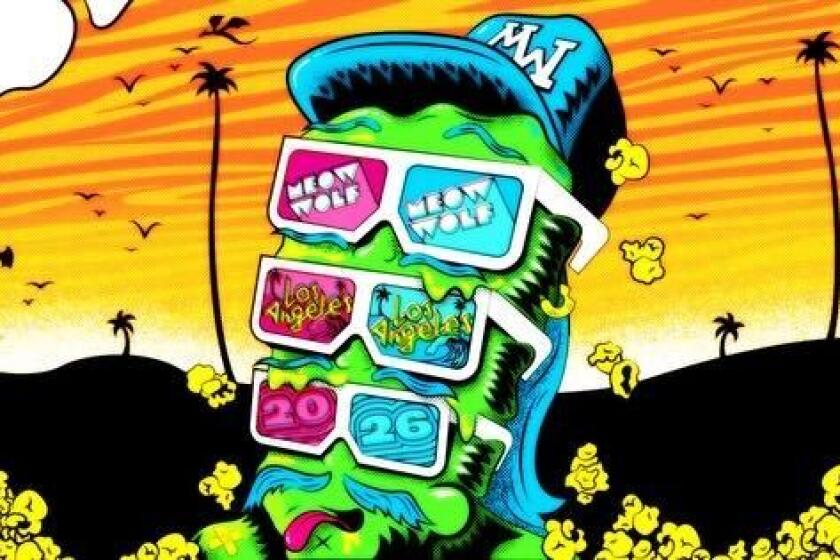Q&A: ‘Summer Camp Island’ creator Julia Pott on the show’s magical, collaborative journey

A clip from Cartoon Network’s “Summer Camp Island.”
In Julia Pott’s “Summer Camp Island,” a pair of best friends discover magic is real as soon as the adults drop off their kids at summer camp. But actual magic takes time.
“Summer Camp Island” has been more than three years in the making, and it’s finally ready for its debut. The entire first season of the show premiered in a marathon Saturday morning on Cartoon Network.
The journey started back in New York, where Pott had moved after getting her master’s degree from London’s Royal College of Art in 2011. She had been working on short films, music videos and advertisements before making the switch to television.
“I was feeling a little unsure of what my path was going to be, and someone suggested I pitch a TV show because I really like making short films,” the British animator said. “They were like, ‘It’s like a bunch of short films in succession with the same cast of characters. That’s the closest thing you’re going to get to making independent shorts.’ ”
Pott then put together her “pitch bible” that eventually became “Summer Camp Island.”
Loosely based on her experience of moving to New York, the show follows Oscar (an elephant) and Hedgehog (yes, a hedgehog) as they discover their summer camp experience is going to be much different from what they expected.
“They go to a seemingly normal summer camp for the first time, and as soon as the parents leave, all this magical stuff starts to come out,” explained Pott. “The camp counselors are actually three teen witches, and there are yetis and the horses turn into unicorns and there’s monsters under the bed.”
After Cartoon Network greenlit the pilot, Pott moved to Los Angeles and started working from the offices of Mike Roth and Nick Cross of the studio’s shorts department.
“It was the first time I collaborated with someone on something that I considered just mine. I was very closed off for collaboration before that,” Pott recalled. “And it was revelatory and really useful and really fun.”
It was two years of development before the series was officially a go, but the show has since hit the ground running. Pott, who cut her teeth as a writer on “Adventure Time,” noted Cartoon Network’s long-running hit series was wrapping up production the same month “Summer Camp Island” was picked up to series.
“A lot of the crew from ‘Adventure Time’ moved onto ‘Summer Camp,’ which was crazy cool and hugely lucky and amazing,” Pott said. “I don’t think the show would be what it is at all if that hadn’t happened.”
Pott recently talked to The Times about “Summer Camp Island,” the advice she received while working on “Adventure Time” and the magic of collaboration. This interview has been edited for clarity.
How much have elements of the show changed throughout the development process?
The biggest change, I suppose, [is that] in the pilot, Oscar has a crush on Hedgehog. We wrote that out of the show because we wanted it to be more about straight best friendship and unconditional love — this boy and this girl that just support each other no matter what, and [romantic feelings] didn’t factor in at all.
Oscar has become more naive and more lovable and just supportive over time. I think all the storyboarders and writers have put their anxieties and their clumsy nature into him, and they sort of put their more intellectual thoughts into Hedgehog.
Hedgehog is this incredibly smart, science-oriented woman, and Oscar is this sweet naive kid who wants to stay a kid and believes in the good in everyone. They balance each other out. They love each other unconditionally, and they’re just exploring this world together.
In the pilot, we explored the very cusp of what the world could be, and now it’s huge.
The show is kind of a big soup of everything I loved when I was a kid.
— Julia Pott on ‘Summer Camp Island’
Aesthetically the style has changed a lot too. The backgrounds in the pilot were illustrated by Rose Blake, and we were trying to match that style. [But] I can’t draw that way and that was really stressful for me because if a background came back, I couldn’t be like, “Oh, more like this,” because I had no idea how she did it.
In the end, Sandra [Lee], our art director, was like, “Just trace over this drawing that we did,” and I did and it matched the characters so much better that we just decided to move forward in my [art] style for the backgrounds too.
Then I felt so much more ownership over it, like it moved into this new space. It felt like a different thing from the pilot, which was really nice because I think I wanted some distance from that a little bit and to freshen it up in my eyes.
What is the most intimidating part about running a show?
I think yourself is the hardest part. I had a lot of imposter syndrome when I first started because I had been on “Adventure Time” as a writer and now I was a creator of this new show with a lot of the same crew.
I felt like I was supposed to be the leader, and that was very stressful for me. I was very conflicted about giving notes to people that I had admired and respected for eons, wondering if my note would be in any way better than what they’d already boarded.
Then someone gave me this advice that when looking at a storyboard, you should look at it as if you’re two surgeons looking at a body and figuring out the best way to operate on it. No one owns the body, you’re just trying to figure out the best way to do this thing together as two impartial people. That helped a lot in terms of talking about the storyboards and stuff.
Do you have a favorite thing that someone else contributed to the show that you hadn’t thought of before?
Everything. I feel like I’m just the person who created the world, and all of my favorite jokes and moments have come from other people. The storyboarding crew is incredible, and the way that they write is so funny.
There’s a weird language that’s developing on the show. These weird shorthands and funny words for stuff that people are coming up with, which I really like.
In one of the episodes, Hedgehog wants to take a brain break and [storyboard artist] Seo Kim shortened it to “brank” — like B-R-A-N-K — and now I think of that when I want to take a brain break. I think, “I need to take a brank.”
You can see a little bit of everyone’s personality in each episode because the characters are skewed a little differently in each one depending on who’s boarded them.
What are some of the more fantastical elements you knew you had to throw in?
The show is kind of a big soup of everything I loved when I was a kid. The aliens look a lot like Mogwai from “Gremlins” because that was huge for me as a kid. And the witches are obviously influenced by “Harry Potter” and the West Witch.
When I came up with the idea, I wanted it to be like “Buffy [the Vampire Slayer],” but for kids, so there’s werewolves and there’s ghosts.
I spent all of my childhood thinking about ghosts, worrying about getting beheaded, worrying about falling into quicksand, and now I never worry about that.
As a kid, you’re living in this far more fantastical world than the rest of us, and you just believe it to be true. That was sort of what we wanted to do with this show. Everything that they suspected was real is on this island. We’re kind of coming at it from a kid-logic perspective: What did you think was real when you were a kid?
What did you pick up while working on “Adventure Time” that has been helpful as you moved on to run your own show?
The whole experience was hugely helpful and definitely a huge part of why I have the show now.
I came on after Pen [Ward] had left and Adam [Muto] was running the show. Adam is an incredible showrunner, and he’s so calm and so smart and works constantly. When I started writing on the show, he was very encouraging and wanted me to speak up more and have my voice in it.
When the show got picked up, I had coffee with Adam and he gave me a good tip. When I was freaking out, he said not every episode is your episode. It can’t all be some amazing short film that you’re making. Some might not be your favorite thing in the world, but other people will love it for different reasons and you just have to let it go.
I met up with Pen for lunch shortly after [the show] got picked up, and he had a similar piece of advice, which was to find one piece in every episode that you really love and fixate on that. If you can love one part of each episode then that’s a huge victory. You don’t have to love the whole thing.
I think when you start, you kind of beat yourself up a bit if stuff feels like it’s not amazing, and you spiral a lot because you haven’t slept and you’re really stressed. Then you learn how to self-soothe in a way, and I think Adam and Pen were very helpful in teaching me how to do that because they’d already been down that road.
Talk a bit more about the camp counselors.
The camp counselors are my favorite. They are three teen witches, and they’ve got magical powers. They’ve got a heavy Harry Potter vibe.
The main witch, Susie, who I do the voice of, is sort of the antagonist of the show. She’s not the villain because she’s multilayered and she has good elements to her. The way we sort of think of her is the bad babysitter, or the older kid who you kind of respect and admire but are very afraid of. She’s definitely got some rich backstory that I can’t talk about just yet.
There’s Alice, who’s kind of obsessed with Susie and is half a year older than her but much more naive and likes cute stuff. Then there’s Betsy, who over time sort of becomes friends with Hedgehog and is the more studious and quiet one. That’s their balance.
What is the anticipation like as you wait for all of the episodes to drop?
I’m nervous; I’m excited. Even if nobody likes it, I’m so proud that we’ve made this, and I’m proud of it. It feels insane that this has happened, and it feels like a dream.
I want it to be out in the world. I’m ready to see what people think of it. It’s quite specific. It might not be for everybody, but for the people that it’s for, hopefully it will resonate with them and it will mean something.
More to Read
The biggest entertainment stories
Get our big stories about Hollywood, film, television, music, arts, culture and more right in your inbox as soon as they publish.
You may occasionally receive promotional content from the Los Angeles Times.

